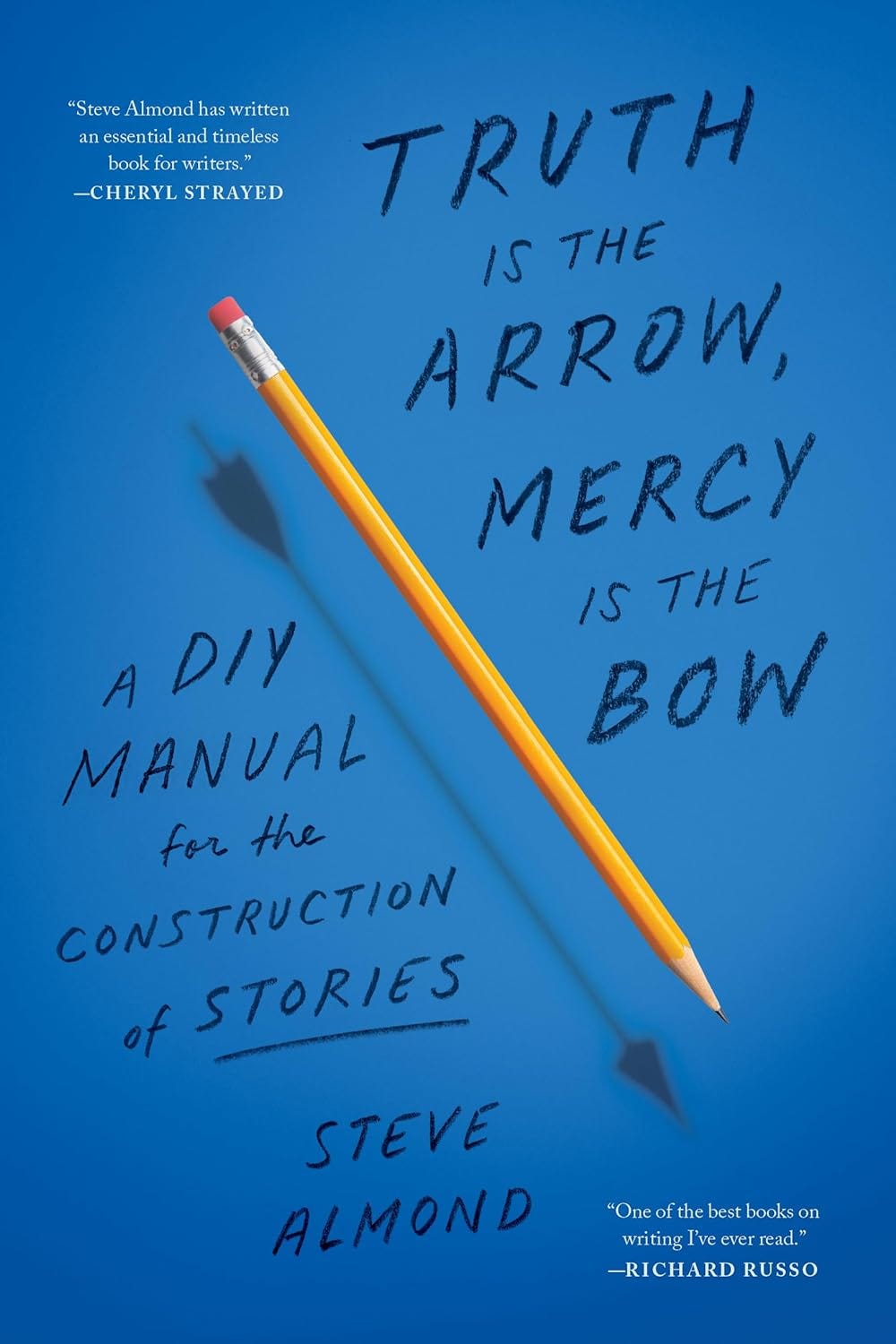"Wrong About Everything" and what I'm learning about memoir this month
Plus, coaching, classes and a Steve Almond book rec!
Fall coaching is open!
Does “back to school” time remind you of big projects you’d like to finish in 2024?
My main service is developmental editing of full manuscripts, both fiction and nonfiction. My secondary service is monthly coaching, usually in five-hour monthly packages. Email me if you’d like more information.
Recent testimonials:
“I’ve worked with Andromeda on several different projects, ranging from historical fiction to YA to a contemporary thriller. In each case, she offered compassionate, rigorous suggestions that gave me clear roadmaps for revision. I’ve already recommended her editorial services to others and can’t wait to work with her again.”
Deborah L. Williams, New York City
“When I sent Andromeda the first 50 pages of my next novel, she responded with the wisest advice I've ever received from a critical reader. Her ideas were both global and specific, and have been a guiding light for me ever since.”
Kim Heacox, Glacier Bay, AK
Nada is going to stop me from working—slowly but steadily—on this book…
My main gig is writing novels. But as you may recall from my last newsletter, I’m also writing nonfiction.
The good news first. My once-a-week commitment to write my language-learning memoir (about the four years I spent learning Spanish, including a stint living in Mexico) is coming along fine. I’m enjoying it, I’m making progress, and I no longer feel conflicted about when and whether to work on it.

Now that I have a non-negotiable plan—write nonfiction 90 minutes every Tuesday—I meet that goal without angst. As an unexpected side benefit, I don’t spend time worrying it’s not enough. Before, the project hung over me, inspiring very little fresh writing, only fresh shame. Now that I have a firm, *TINY* goal each week, the shame has been vanquished. (And sometimes the 90 minutes turns into four hours. But it doesn’t have to! I’ve also resisted adding a second day to the weekly commitment because one “never-miss” day beets two “maybe” days.)
Here’s the funny thing I discovered.
Oh my lawd, I had lots of details wrong. In fact, Wrong About Everything could be my provisional title if I didn't need the words “Spanish” or “fluency” in there somewhere.
I was wrong about:
—How long it took our daughter and her friend, who shared the adventure with us, to make new friends in our little Mexican town after a rocky start. (I was thinking…three or four months? It was FOUR DAYS. Then we couldn’t keep the kids home because they were running around to sporting events and parties, being serenaded by boys, and doing all kinds of extracurriculars.)
—How many times I met with a new female friend, the first person with whom I was attempting regular Spanish conversations. (I thought: three or four times? Ummm…more like over a dozen! What a cruddy amiga I am, forgetting so much about that first relationship in favor of later ones, when my Spanish had improved.)
—That I was working three remote jobs and doing final edits on a novel during my first months in Mexico. I thought I was…I don’t know… kayaking and drinking rum? Not understanding my work schedule made it hard to understand how I spent the rest of my time each day. NOW I know.
These corrections may seem small, but they are helping me align and wrangle other missing memories. Some days it feels like crawling under a bed, reaching a hand into the dark for any dustballs I can find.
Ironically, I’ve kept detailed daily travel diaries with extensive dialogue and descriptive detail for my entire adult life. Our time in Mexico was an exception, especially the first six months. I was using my free time to study Spanish, and I couldn’t handle the double task of keeping notebooks about grammar and vocab while also keeping notebooks about what we were doing day-to-day, beyond language study. I didn’t realize I’d be writing something memoirish about this time period.
Thank goodness I am starting to find my way back to some key moments, now.
How I am retrieving these lost memories
I’ve taught classes in memoir, and I’ve introduced fun tricks for recovering
lost memories using all kinds of creative triggers, from photos and music to smells and hand-drawn maps. Our memories are notoriously poor. And/but, we can remember more than we think.
You’d think I would have applied all these tricks prior to digging back into my memoir.
Nope! Because I wanted wordcount, baby! I wanted something to send my agent! No time to mess around going on a wild goose (or gamusino*) chase. I had no patience for it! I wanted a finished rough draft done before I lost motivation, having worked on this book for so long in fits and starts already.
But guess what? Without enough specifics, I ended up writing inadequate passages full of vague summary. This is a personal and mostly light-hearted book—not journalism, not history, not a serious family memoir involving sensitive topics—so I don’t mind terribly if I bungle a timeline here and there. After all, that’s inevitable when we write about the personal past. But I was very disturbed that I couldn’t remember staggeringly large parts of our Mexico experience.
Turns out I have to do the work.
That work includes interviewing family members who have fragments of the memories I’ve lost, which I will continue doing iteratively—one memory fishing trip after another. But the most surprising trick I discovered is going through my emails from 2015, the time period in question.
At first glance, my inbox didn’t seem to go back that far. But then I applied a search term I discovered through google: older_than9y. It also works to format it this way: before:2015/12/31. The format must be precise. YYYY/MM/DD and the slashes matter.
These emails were invisible, even when I’d dug into the “supposedly” oldest of the 24,375 emails in my inbox. (Gulp.)
The even older, hidden emails included letters I’d written to friends and family with details that didn’t seem important then, but now are functioning like diary entries with brief but accurate (thank god) details.
I even appreciated seeing receipts for things I’d purchased—like books I was reading at the time. More threads to pull!
This google trick won’t help if you’re writing a memoir that goes back more than a decade. But possibly something else will. Old letters? Old newspapers? Old bills? The hardest part is just getting started when you’re not sure what you’ll find. A seemingly dull document may remind you of an event from that time period. One rediscovered new fact can shine like a shooting star, trailing a long, dusty trail of associated memories that light up your synapses.
And here’s one last thing about accepting total blanks
I’m also learning about the importance of accepting missing memories as an efficient filter.
When something really matters, we often do remember it (albeit nearly always inaccurately, research confirms). For example, I can tell you nearly everything—dailogue included—about the first day my daughter and I had to face a Mexican school system bureaucrat in stilettos and dark silver lipstick who thought we were monoglot idiots who should high-tail it back to the United States. Embarrassment and indignation burned that memory into my brain.
But for some reason I have almost zero concrete memories relating to the entire *month* my husband, who only speaks a little Spanish, and I committed to speaking no English. I know we argued. I know we persevered. But I don’t have the dialogue to go along with those certainties! Maybe because my brain was boiling with linguistic frustration? Or maybe because the story’s specifics just don’t matter enough.
Life-changing trauma is one thing. But if you forget some other minor details you feel you should remember, is that perhaps your brain telling you it’s just not that important? Should we thank our brains for this selective winnowing process, which effectively declutters our minds, creating room for the important stuff? (This 10 Percent Happier podcast episode on the science of memory definitely takes that view.)
It is surprising how little will fit into a memoir or any kind of book, actually. That’s what I’m noticing as I write this one, scene by scene. I may only get a few key moments per month or season over the four-year period I’m covering. There isn’t room to explain how my husband and I drove each crazy for thirty-one days in May 2015. I may only have room to explain how we drove each other crazy for five minutes on one specific afternoon.
Thanks for being so willing to give up your mother tongue for a whole month, Brian! You’re a patient man!

*gamusino=fictitious animal that can only be hunted at night.
Small news department: Dive Cheap, Tri Hard, Read Now!
DIVE. On sale now: for a limited time, hardcovers of The Deepest Lake cost only cents more than the future paperback! I have a hard time, personally, with how much books cost, so I like to announce sales when I see them.
TRI. I am registered to race in the new Tri-Cities Washington 70.3 Half Ironman in less than two weeks. Since I finished my full Ironman in November 2023, I’ve been bereft. Returning to training this summer really picked up my spirits, and now I am both excited—and VERY nervous—to race again. Expectations are dangerous, but I’m hoping to swim, bike, and run faster than I did in my first two races…unless the temps hit the 80s, in which case I will simply try to finish and not pass out. Whatever happens, I promise to learn from the experience.
READ. Looking for a book about writing from an incredibly nice, humble guy who knows it ain’t easy? Steve Almond recently released Truth Is the Arrow, Mercy Is the Bow to rave reviews. My favorite chapters—about writer’s block (a more nuanced discussion of block as a continuum) and about workshops gone bad (a subject I’ve written about myself for Jane Friedman’s newsletter, as well as in novel form) are in the second half. Almond narrates the audiobook. The more he shares of his personal story—including anecdotes about how many novels he had to write before his first was published—the better the book gets. Long ago, when I lived in Anchorage, Almond came to give a workshop that I helped arrange as director of 49Writers. The topic was writing sex scenes—yet another topic he covers with humane wisdom. A final note: you can disregard the word “stories” in the subtitle if it leads you to think only about short stories. Almond writes both fiction and nonfiction, and much of what he has to say applies to all creative writing.
Good luck transitioning into fall, everyone!





I just finished that Steve Almond book this morning. So good! I underlined, like, half of it, I think. Good luck with the next tri!!
Love the firm, tiny goal! I listened to Steve Almond's book too and have been recommending the audio to every writer I know—so much wisdom and humor! I'd love to take one of his workshops!